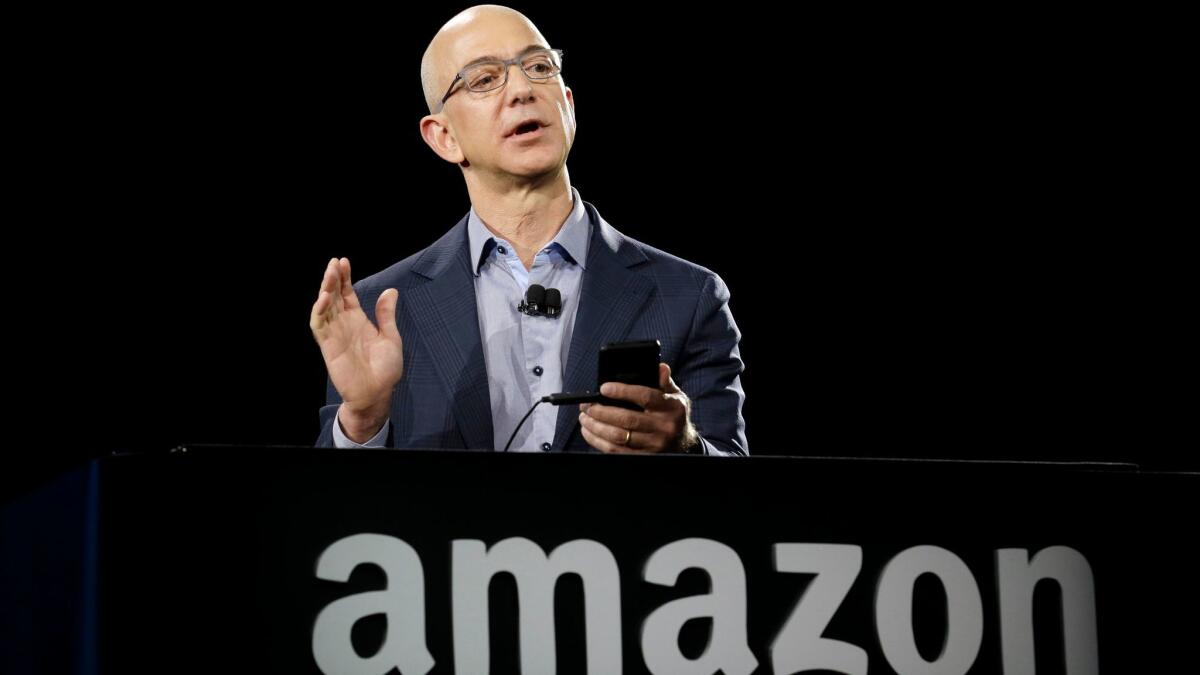Op-Ed: A bookseller’s advice for Amazon CEO Jeff Bezos

- Share via
Amazon founder Jeff Bezos, one of the world’s richest people with a net worth north of $90 billion, recently asked his Twitter followers for suggestions regarding philanthropic giving. He wanted their ideas on how to help the world become a better place. “I’m thinking I want much of my philanthropic activity to be helping people in the here and now — short term — at the intersection of urgent need and lasting impact.”
As a bookseller, I’d like to offer a suggestion: Stop hawking books on Amazon at such drastically slashed prices.
Mr. Bezos, your strategy was brilliant. You offered up books at unbeatable prices and threw in free shipping as well. The public was hooked. You broadened your inventory and offered other items. With the convenience of shopping 24/7 from one’s own computer, you transformed retail. And it brought you immense wealth.
Years later, you continue to sell books at a heavy discount, often at half the list price. For us brick-and-mortar booksellers, this master business plan you devised has been devastating. Independent bookstores across the country were forced to close their doors. Where once neighborhood bookstores abounded there are now many communities that have none.
You don’t have to work through the intermediary of a charity. You can simply raise the price of the books you offer for sale on your site to fair market value.
Now, it’s true that the indie industry has recovered somewhat since a low point in 2009, and that the number of stores has actually been growing. But it’s still an extremely tough business, in part because of you.
There is no way we can come close to matching your undercut prices. If we were to sell books at the rates you do — at or below what we buy them for from publishers — we would have no money to pay our rent, our staff or our utilities. It just can’t be done. Believe me when I tell you, no one gets rich running a bookstore – the profit margin is modest at best. To just break even after expenses is to run a successful store.
We do it anyway because selling books is a calling. Booksellers are devoted to the written word. They find immense pleasure in finding just the right book for a customer in search of something to read. A good bookseller can do this even if the customer is looking for a genre that the bookseller is not well versed in. That’s the art of bookselling.
Books are not just a commodity, like a car battery or jacket or pair of boots. They tell our stories and are the basis of our culture. They let us travel to worlds we would never otherwise see. They open our eyes and make us better for the things they reveal. Books let us escape our problems or help us to solve them; they inspire us. They present new, different perspectives, make us think and invite dialogue.
It’s therefore vitally important that we avoid a future in which a single company has a virtual monopoly on bookselling. That company could decide which perspectives to disseminate, and which to silence.
A neighborhood bookstore provides shelves for a child to walk beside and discover a story that piques his or her curiosity. It is a place where readers of all ages gather. Neighborhood bookstores provide readings for authors to discuss their stories, for book groups to have discussions. Bookstores bring people together for real, face-to-face, human-to-human interactions. They invite diversity in publishing by championing budding voices and new small presses.
I ask you to think about this now that you have reached a place where you desire to help people.
You don’t have to work through the intermediary of a charity. You can simply raise the price of the books you offer for sale on your site to fair market value. Yes, what I’m asking you to do is no more, or less than to make a profit on your book sales. You might see a drop in how many books you move, but people would continue using your site for the convenience. Surely you must know this is true.
By implementing this single yet monumental change to your business model, you would remain the most powerful retail site in the country, still generating tremendous profits. But you would give independent neighborhood bookstores a better chance to survive and promote reading culture “in the here and now.” That would be a lasting legacy.
B.J. Hegedus is a gift-buyer and the merchandising designer for Vroman’s Bookstore and Book Soup.
Follow the Opinion section on Twitter @latimesopinion or Facebook
More to Read
A cure for the common opinion
Get thought-provoking perspectives with our weekly newsletter.
You may occasionally receive promotional content from the Los Angeles Times.









